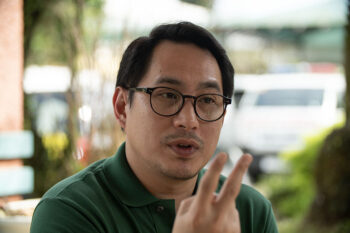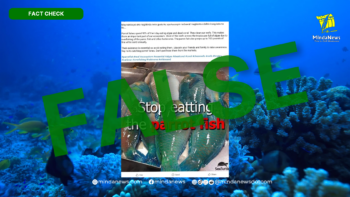V. Dilemma and Option
[Author’s Note: This article is fifth and last in the series Option to Consider. The fourth in the series, “Crucial Stage”, was published in MindaNews on August 28, 2013. The two of the four Annexes to the Framework Agreement on Bangsamoro still being negotiated are material to “Dilemma and Option”, so we had to postpone writing this article.]
GENERAL SANTOS CITY (MindaNews / 12 January) – In the earlier articles of the series, we noted that Government and Moro Islamic Liberation Front signed the FAB (Framework Agreement on Bangsamoro) on October 15, 2012 to establish Bangsamoro to solve the Bangsamoro Problem; but they have been mired in the Annexes since then. The FAB is an agreement on key principles; the Annexes provide the details to flesh out the key principles – contentious but necessary.
The contrariness of this reality is reflected in other realities similarly rooted.
First: To MILF, the Bangsamoro Problem is primarily a political problem first needing a political settlement; to Government, the Problem is socioeconomic calling for economic development. MILF has tenaciously held on to its position; Government has conceded to a political settlement but subtly maintained its view.
Second: MILF has voiced serious concern about the slow pace of the negotiation on the Annexes since time is vital to the proper transition of Bangsamoro; to Government, so long as there’s enough time to elect the first regular officials of Bangsamoro and to inaugurate it before the President steps down on June 30, 2016, the slow pace of the negotiation does not matter – obvious in the statements of the President and the chief negotiator of Government.
Third: Government has given the assurance that all agreements are within the 1987 Constitution; but, anticipating MILF demands that are unconstitutional, it has agreed to allow the Bangsamoro Transition Commission to recommend amendments to the Constitution if necessary. While this is “thinking outside the box”, it gives “spoilers” the ground to question the constitutionality of the BBL (Bangsamoro Basic Law).
Element of Time
When the FAB was signed on October 15, 2012, the four Annexes were expected to be signed in December that year. During the entire year of 2013 the BBL would be drafted, enacted, signed, ratified and promulgated. The ARMM (Autonomous Region in Muslim Mindanao) will be abolished and the BTA (Bangsamoro Transition Authority) will form and oversee the interim government of Bangsamoro during its two-year transition, 2014 and 2015. In May 2016, the regular Bangsamoro officials will be elected; Bangsamoro will be inaugurated by June 30.
But the expectation fell flat. No Annex was signed in December 2012. The Annex on Transitional Arrangement and Modalities was signed in February 2013; that on Wealth Sharing, in July; and that on Power Sharing, last December 8 without the contentious component, “Bangsamoro Waters”. The Parties will tackle the “Bangsamoro Waters” as an addendum to Power Sharing together with the Annex on Normalization when they meet on the 14th of this month,
Can they complete the Annexes this month? If they can, they will be ready to craft the Comprehensive Peace Agreement by consolidating the FAB and the Annexes. The CPA is imperative for the BTC to finalize the BBL draft so it could be submitted to the President in May for him to certify to the Congress as “urgent”.
Can they finalize and sign the CPA in one meeting? That depends on whether the FAB and the Annexes would be simply put together and signed or whether there is a need for more inputs and deliberation – if the first, probably yes; if the second, probably not.
To MILF, “The CPA is not just a piece of paper; it contains principles, most likely on the following: how the Autonomous Region in Muslim Mindanao (ARMM) is going to be abolished; the conduct of the plebiscite for the ratification of the BBL; and the manner of amending the Constitution, if necessary.” (Luwaran Editorial, January 1, 2014: 2014 crucial year in peace talks) It suggests more inputs and deliberation.
Why must the BBL draft be in the Congress by May? MILF, speaking through the same Luwaran editorial cited above, sees 2014 as the only good time left for the BBL draft to be deliberated in the Congress. “By 2015 the atmosphere will change radically; the fever of the 2016 presidential election will begin to spread its divisive and paralyzing effects. … Even a non-partisan issue like the Bangsamoro Question and its early resolution [by enacting the BBL] will be affected.”
This observation is supported by a precedent. President Fidel V. Ramos sent the GRP-MNLF 1996 Final Peace Agreement to the Third Session of the Tenth Congress immediately after it was signed on September 2, 1996. As agreed, it would be enacted to amend the ARMM Organic Law, RA 6734, within two years. The amendatory RA 9054 was passed in February 2001, the last half of the Third Session of the Eleventh Congress. In 1997, the Congress was consumed by the 1998 presidential election.
Besides avoiding the unfavorable political atmosphere, “the BBL should be ratified by the people in the Bangsamoro territory preferably towards the end of this year or early 2015 to make way for the establishment of the Bangsamoro Transition Authority (BTA).”
The imperative to submit the BBL draft to the Congress by May so as to make the other imperative – to start the Bangsamoro transition by “early” 2015 – possible will be negated should the Parties fail to meet the deadlines in finalizing the Addendum and the Annex on Normalization and in signing the CPA.
However, Ferrer’s assurance is encouraging: “By early next year, we aim to finalize the remaining Annex on Normalization, as well as an addendum on the Bangsamoro waters.” She assured, too, that the government panel, in 2014, will work closely with the BTC and the Congress “to ensure the smooth passage of the Bangsamoro Basic Law”. (OPAPP Website, December 24, 2013: End-of-Year Statement of the GPH Panel in Talks with the MILF)
BBL Draft Deadline
MILF chief negotiator Mohagher Iqbal and concurrent BTC head has set April 2014 as the deadline to finish the BBL draft for submission to the Congress in May (Philippine Daily Inquirer, December 8, 2013; MindaNews, December 9, 2013; Luwaran, December 31, 2013). In fact some congressmen had wanted the draft submitted in January 2014.
The BTC members should be commended for their dedication, determination, initiative and readiness to learn. Since their appointment in the last week of February 2013, they have invited local and foreign constitutional experts to conduct workshops, made local consultations and visited model autonomous political entities like Aceh in Indonesia to enrich their capacity to write a basic law most apt for Bangsamoro.
In anticipation of time constraint due to the slow pace of the negotiation of the Annexes they have engaged civic groups to help conduct public consultations. With the FAB, the signed Annex on Wealth Sharing and other available documents, the committees wrote tentative draft provisions to be finalized after the signing of the CPA.
While late, with the signing of the Annex on Power Sharing, the Committee on Political Autonomy, the pivotal committee, held its first crafting workshop on December 27 and 28. Since about 70 percent of the BBL is within the scope of this committee, the two-day activity was considered “the initial crafting of the BBL”. (Luwaran, December 31, 2013: Annex on power sharing speed up works of BTC committees)
The drafts of the other standing committees will be “harmonized with, incorporated and fused into” the draft of the Committee on Political Autonomy. This makes most urgent the signing this month of the Addendum and the Annex on Normalization without which the Committee cannot complete its draft.
Can BTC meet this deadline?
It depends on how the six committees, especially the Committee on Political Autonomy, can accomplish the daunting task of translating the 12-page Annex on Power Sharing into the BBL draft by April. It also depends as much on how early the Parties can ink the CPA without which the BBL draft cannot be finalized.
Adverse Circumstances
Let us not underestimate the Parties’ will to overcome adverse circumstances in order to fulfill their commitments. Finishing the BBL draft by April, within the constraint of three months, and shepherding it through the Congress so that the BBL draft will be the BBL act to be ratified and promulgated within 2014 is the first of the adverse circumstances. There are more.
The leaderships of the House of Representatives and the Senate have assured the Parties, in response to the President’s appeal, that they will give the BBL legislation their special attention. But they will not just rubber stamp the draft; some members will insist in scrutinizing it thoroughly. It may be critically questioned in the public hearing. Will BBL be enacted as originally drafted? Will the draft not be revised like what had happened to the original draft of RA 6734 and to the 1996 Final Peace Agreement?
There are provisions in the Annexes that are evidently unconstitutional. Questions on some have already been raised in the media. These can be challenged in the Supreme Court right after the signing of the CPA. If drafted into the BBL with recommendation to amend the Constitution, these will be challenged in the Congress and in Court if carried in the BBL Act. This will eat up time that the Parties can ill-afford to lose.
Constitutional amendments can complicate the plebiscite to ratify the BBL. Without constitutional amendments, the plebiscite will be confined to the Bangsamoro area. But can this be done if the amendments will modify constitutional principles, doctrines and political structures that define the foundation and asymmetry of the Republic of the Philippines – a serious national concern? A national plebiscite can spell death to the BBL.
Can the Parties preempt or overcome these adverse circumstances, and perhaps more?
Proper Transition
This we can surmise: The President will create the BTA and appoint its members; the BTC will provide in the Transitory Provisions of the BBL the scope of the task of the BTA. For proper transition, the BTA task will most probably encompass Part One.(1) of the Annex on Power Sharing (APS) – asymmetrical nature of Bangsamoro – and most of Part Two, the ministerial structure of the Bangsamoro government.
The primary task of the BTA is to administer an interim government in preparation for the installation of the regularly elected government. An Interim Bangsamoro Assembly will be appointed that in turn will elect the interim chief minister who will appoint the interim deputy minister and interim ministers of the cabinet according to Part Two.(5) of the APS. The ministerial government shall have been put in place when the regularly elected officials take over.
Unless the BBL will provide otherwise, we expect the First Bangsamoro Assembly to be elected under “an electoral system suitable to a ministerial form of government (Part Two.4 of APS)”. Should such be the case, the interim government will have to provide the mechanism to make such electoral system operate unless the Interim Bangsamoro Assembly can pass a Bangsamoro Election Code. Will it be a start on the right foot to elect the First Bangsamoro Assembly under the Omnibus Election Code?
Will there be enough time for the proper transition to happen?
MILF Dilemma and Option
Time is the most difficult obstacle in the way of the peace process. The dilemma and hard option will be on MILF especially if the regular government of Bangsamoro has to be installed before President Aquino III steps down on June 30, 2016.
If the BBL can be ratified and promulgated by December 2014, MILF – as inferred from its leaders – can make do with the whole of 2015 to transition the Bangsamoro. But what if due to adverse circumstances the BBL draft cannot be in the Congress in May? Worse if only a few months of 2015 will be left for the BTA to do its daunting task!
Can a hastily – hence, improperly – transitioned Bangsamoro solve the Bangsamoro Problem? In several pronouncements, MILF panel chair Iqbal and MILF chair Murad said MILF will not accept a Bangsamoro that will not solve the Bangsamoro Problem.
In the event that much shorter than 12 months would be left for the transition proper and the MILF would think that the Bangsamoro that will solve the Bangsamoro Problem can no longer be entrenched, can the transition proper not be stretched to a full three years? In three years, the ministerial form of government will be firmly rooted. The electoral system described in Part Two.4 of APS would be fully set up as the vehicle to elect the Bangsamoro Assembly as well as the officials of the local governments.
Once the BBL is promulgated and the BTA takes over from ARMM, Bangsamoro is entrenched. That will be among the legacies of President Aquino III.
Mere entrenchment of Bangsamoro will not solve the Bangsamoro Problem as envisioned. Government has to assist Bangsamoro to grow in order to realize its vision. This task will fall on the succeeding governments.
The Government-MILF peace process is not to Aquino III’s credit alone. Three other presidents should not be robbed of the credit due them: Ramos started it; Estrada continued then scuttled it; Arroyo revived it, asked Malaysia to facilitate the talks and crystallized the solution. Aquino III, averting the mistakes of Arroyo, should be credited only for establishing the bridge to the entrenchment of Bangsamoro. Bangsamoro has to be nurtured. This will be credited to future presidents if they do their task.
(“Comment” is Mr. Patricio P. Diaz’ column for MindaViews, the opinion section of MindaNews. The Titus Brandsma Media Awards recently honored Mr. Diaz with a “Lifetime Achievement Award” for his “commitment to education and public information to Mindanawons as Journalist, Educator and Peace Advocate.” You can reach him at patpdiazgsc@yahoo.com.)







